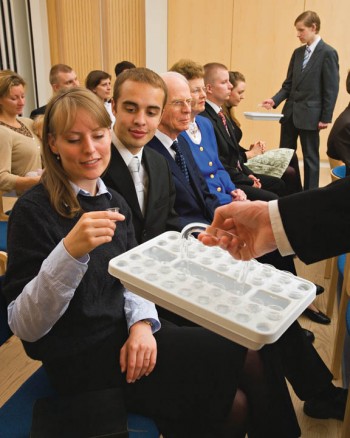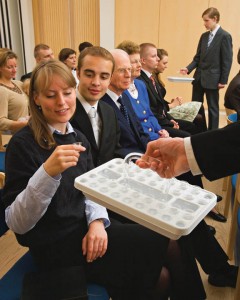Catholics teach that Christ died on Friday, and for that reason, they follow special penitential observances on Fridays, willingly suffering as He suffered, and traditionally, this has required the sacrifice of the eating of meat, something many people enjoy. They use Friday as a special time to draw closer to God, to become aware of their sins, and to work to overcome them. Although the bishop’s counsil suggests this is now voluntary, but encouraged, Catholics are still asked to use Friday as a day to draw closer to God and can substitute other penances. (Pastoral Statement on Penance and Abstinence A Statement Issued by the National Conference of Catholic Bishops November 18, 1966)
Mormons do not abstain from meat, but there are other ways in which they too and focus on seeking forgiveness of and abandonment of their sins.
One such method is the weekly taking of the Sacrament. Mormons are baptized for the remission of their sins at age eight, which Mormons consider the age of accountability. Thereafter, sins are repented of as they occur. Each week, during the Sacrament Service (the basic worship service), Mormons partake of the Sacrament of bread and water, in remembrance of the death of the Savior. At that time they renew the covenants they’ve made with him. While they needn’t be perfect to partake, they are expected to prepare themselves for the taking of the Sacrament by having examined their lives and repented of their sins.Another way Mormons sacrifice for God is through a monthly fast. The first Sunday of each month they abstain from all food and drink for twenty-four hours, which involves skipping two meals. For instance, they might start their fast immediately following a late lunch on Saturday afternoon, and resume with a late lunch on Sunday afternoon. They arrive at a special church service having fasted nearly the entire twenty-four hour period. They donate the money saved by doing so to a special fund, called a fast offering, to meet the needs of the poor. During the course of the fast, they’re expected to spend their time in spiritual pursuits as far as possible, studying, praying, and reflecting. This is, like the Catholic penance, a time to grow closer to God and to reflect on our spiritual progress. It’s also a time to pray for any exceptional needs we might have, or that others we care about might have.
Mormons are taught to spend time contemplating the great sacrifices the Savior made on our behalf, both in Calvary, where He took our sins upon himself, and on the cross, when He died for us.
The picture we often see of the Savior kneeling in the Garden of Gethsemane can’t begin to help us understand what the Savior, Jesus Christ, endured that day for us, the day He took on our sins and began the process of becoming our redeemer. He endured a pain greater than any of us can imagine, and He did it alone. His friends were asleep. His earthly family wasn’t there. His Father in Heaven withdrew and did not-could not for our sakes-intercede. This was something the Savior had to do alone, just for us, without help, and He did. He could have stopped it. He could have turned away from the pain and suffering, and gone back out into the world, but He didn’t. He stayed and gave us the redemption from our sins.
Gordon B. Hinckley, the former Mormon prophet, said:
“He lives, the Savior and Redeemer of all mankind, whose Atonement came as an act of grace for the entire world. … He has done for us what we could not do for ourselves. He has brought meaning to our mortal existence. He has given us the gift of eternal life. … God be thanked for the gift of His Son, the Redeemer of the world, the Savior of mankind, the Prince of Life and Peace, the Holy One” (“A Testimony of the Son of God,” Liahona and Ensign, Dec. 2002, 4-5).


